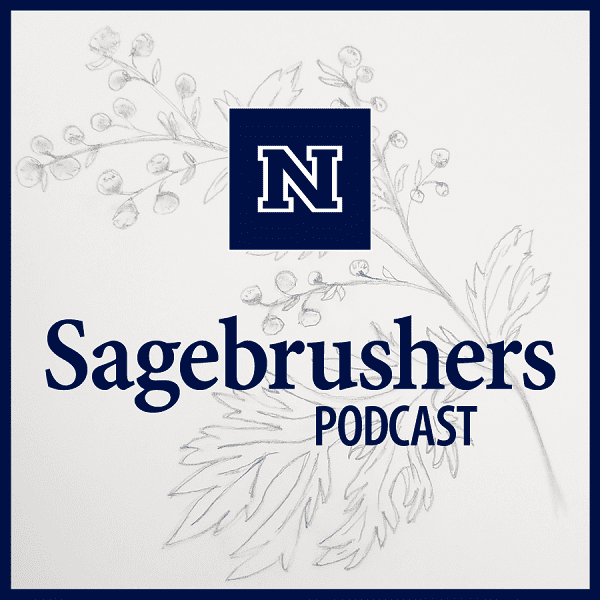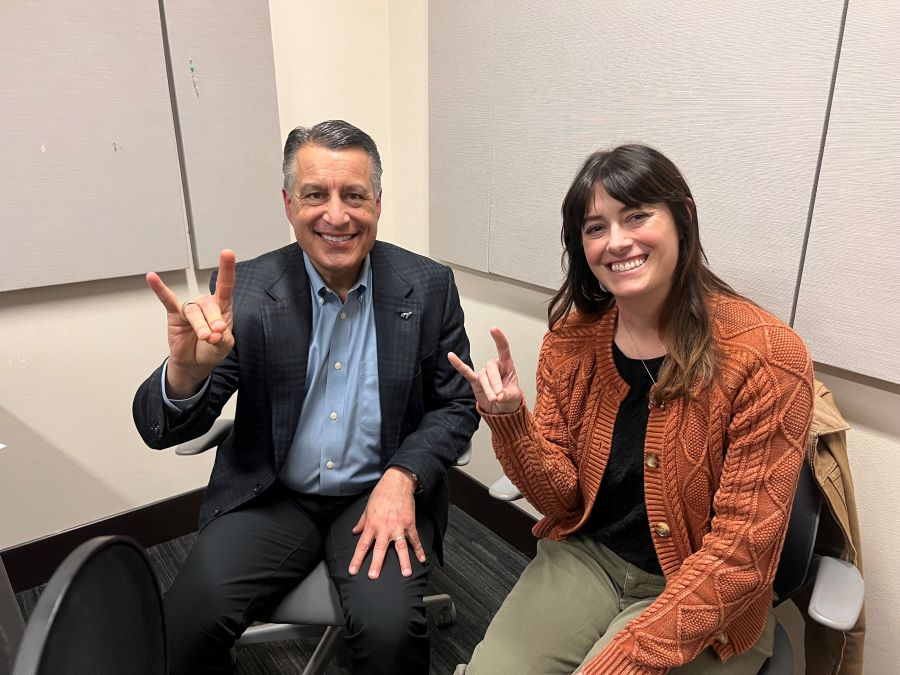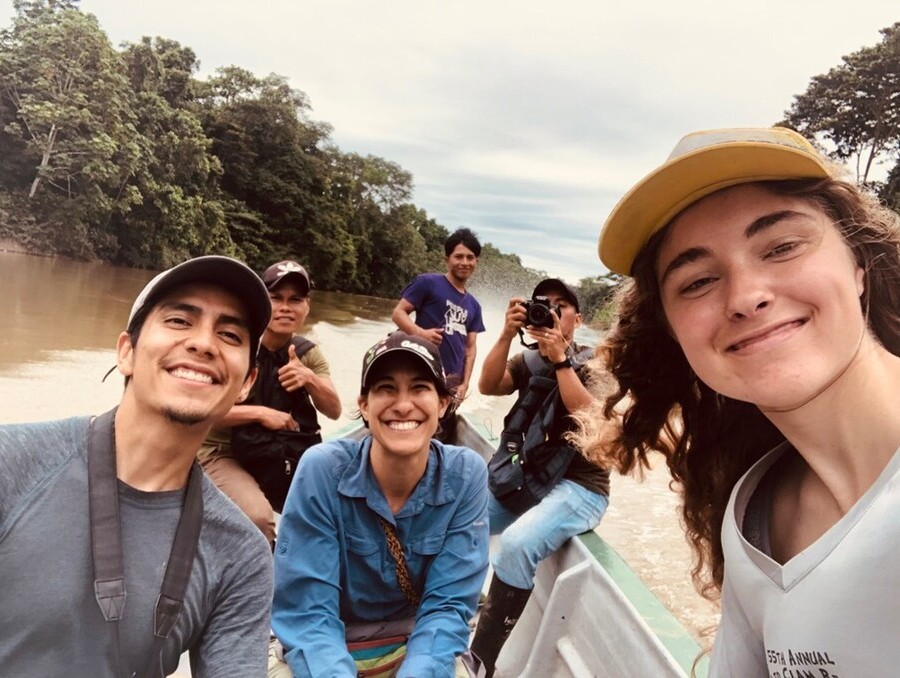
In this episode of Sagebrushers, University of Nevada, Reno President Brian Sandoval speaks with the University’s Sustainability Manager, Phoebe Judge.
Her career has spanned the public, private and nonprofit sectors where she’s worked to educate communities on the economic, social and environmental benefits of sustainability.
In this special Earth Day episode, Sandoval and Judge discuss the university’s strategic goal of making Silver and Blue the New Green. They delve into the progress the University is making and examine future strategies that will help to reduce the carbon footprint. Additionally, they talk about the possibilities and growth of the new Sustainability Certificate that will be offered at the University of Nevada, Reno at Lake Tahoe starting in fall 2024.
Sagebrushers is available on Spotify, Apple Podcasts and other major podcast platforms, with new episodes every month.
Sagebrushers – S3 Ep. 3 – Sustainability Manager Phoebe Judge
Join host President Brian Sandoval as he and Phoebe Judge, campus sustainability manager, discuss the University's goals for conservation and the launching of a sustainability certificate.
Phoebe Judge: Sustainability isn't just for certain people interested in the environment. Sustainability impacts everything. Sustainability is really about thinking about how we live our lives now so that generations of the future can meet their needs.
President Brian Sandoval: This is Sagebrushers, the podcast of the University of Nevada Reno. Welcome back, Wolf Pack Family. I'm your host, University President Brian Sandoval. Serving as a leader in campus sustainability and environmental expertise has never been more important for our institution. Yet, recognizing progress can be challenging when improvements in sustainability are often invisible. Today's guest shares how we can make these efforts visible and acknowledge even the smallest victories. Phoebe Judge, the University's sustainability manager, joins me now to discuss sustainability efforts around campus, her journey to this career path, our new sustainability certificate at the Lake Tahoe location and more. Let's get started.
Phoebe's career has spanned the public, private and nonprofit sectors where she's worked to educate communities on the economic, social and environmental benefits of sustainability. She began her career as a community organizer for the Clean Energy Project in Southern Nevada. She worked in the fields of solar and energy efficiency in Boulder, Colorado, and was most recently the Northern Nevada recycling coordinator for Waste Management. In her current role, Phoebe works to decrease our university's environmental impact and drive our sustainability mission forward. Today's podcast is being recorded at our Reynolds School of Journalism on our University's campus. Phoebe, welcome to Sagebrushers. I am so excited to hear about your work on campus and the important impact it's having.
Phoebe Judge: Thank you. I'm so excited to be here.
President Brian Sandoval: This is going to be a great episode. So we have much to cover today, but I want to start with your background. I understand that you graduated from this University and found your passion for sustainability right here on campus. So tell us a little bit about your history and your journey to the University.
Phoebe Judge: Yeah, gosh, it's such a good question because I love Northern Nevada. I love Reno. I love being here, and it's wonderful to be back at the University. I grew up in Reno. My dad went to Reno High. I went to Reno High. My grandmother was a cocktail waitress at the Mapes. For younger people, you probably don't know what the Mapes was, but it has an interesting history in Nevada, and I'm a first-generation college graduate. So when I started at UNR, I really struggled with how to be a college student. I think that's common with first generation, and it took me a while to figure out what I wanted to study. I kind of bounced around and tried a few different things like philosophy and environmental literature. I even took a year off and moved to Michigan and worked on a dude ranch where I led trail rides and just thought about what is life where I'm working outside all day, and do I want that or do I want to be in a desk position?
So I was tossing around all of these ideas and I took an environmental economics class, and it just really spoke to me. It was such a good way to understand how the world works, and I think that specifically how does the world work has been a major motivator for me in life. And when you learn traditional economics, which is part of the core curriculum, it just doesn't do a good enough job of accounting for the complexity of human-environmental systems. It doesn't know how to value something like a forest left untouched, right? So what's the value of beauty? What's the value of shade? What's the value of peace? Fresh air, clean water? We can all agree these are incredibly valuable things, and where do those fit into economics? Where do they fit into the conversation of should we cut down these trees or not? So I think the neat thing about that program is really entering into the conversation to make sure that those values have a voice. And that was kind of it for me. Once I found that, it set a path for me in life that I really wasn't sure about. Sustainability, jobs didn't really exist at that time, certainly not in Northern Nevada, but I knew I wanted to make an impact on my community, and I wanted to spread this message and share this information. So that's where I am now. And to be back at UNR doing that very thing, it's been a very sentimental experience for me so far.
President Brian Sandoval: No, that's an incredible story. And just as an aside, that's why I love this place, is you can find your passion and find your destiny while you're at the University of Nevada as a student. So, now you're here as the University sustainability manager, and you're tasked with helping us fulfill one of our key goals in our strategic plan, which is making silver and blue the new green. Can you explain what that means to you and how are you beginning to tackle that challenge? And can you please share with us a little bit more about what you do?
Phoebe Judge: Yeah. Gosh, when I came back to campus and saw how much it's changed since I left, and to see this as one of only six goals, and all of them big goals, but one of six that were central to how the university envisions its future, it just meant a lot to me as alumni and as a Northern Nevadan and as the University's sustainability manager, to know that I would be supported in my efforts. And from what I can tell so far, it means a lot to lot of people on this campus as well, just to know that the University is serious about sustainability and really trying to approach it with big goals in mind and to demonstrate that one of the strategies of the goal is establish Reno-Tahoe as an epicenter of sustainability, education, research and leadership. I mean, think about that. That's a big goal and that's a hard thing to accomplish.
Leadership doesn't just fall on your lap. So, the way I've started tackling this, and I'm not the only person doing that. I'm working with a group of folks that are incredibly talented and knowledgeable. So we're starting to tackle this, and this big part of my job, which is how do we measure this? How does our energy usage compare to other universities with similar climate zones? How do our research and our course offerings compare to who we now see in the world as leaders? What does it mean to be a leader in Northern Nevada? How can we do that in our own way? And that's a big challenge, but it starts with where are we now and where do we want to go. The next part that I'm really focused on is how do we move the needle?
The University is like a small city. We manage over 7 million square feet of building space, and because of that size, we have a big environmental footprint, and there's just no way around that. We have a lot of buildings. We have 19,000 students enrolled. We have around 6,000 employees, and little changes can add up, and then big changes are very expensive. So, it's kind of trying to balance out all of these costs and benefits. What's composting, for example, we do compost our yard waste, but if we wanted to compost, say like food scraps, we don't produce that many food scraps on campus. We do a lot to minimize those things. And if we wanted to compost them, we'd have to ship them to Carson City, which costs fuel. So everything is a trade-off. Where does it balance where it's a benefit?
President Brian Sandoval: So, another question for you. So what are some other examples on campus that really show that we're serious about sustainability?
Phoebe Judge: Yeah. The hard thing about sustainability and showing that we're doing a good job is that most of it's invisible. You're not seeing it, but there's no moment where sustainability has been accomplished. We're done. We figured it out. We're now sustainable. It's a journey. And fortunately, UNR has already been on that journey. The number one policy I'd say is that UNR buildings are built to LEED Silver equivalency. And that's been our policy since about 2006. I think the Joe Crowley Student Union, to my knowledge, was the first building that we really built with sustainability in mind. And for those that don't know, LEED is a gold standard for building design and stands for leadership in energy and environmental design. I also recently did this calculation, and I'm an energy efficiency person, so I apologize if it bores anyone else, but I find it fascinating that in 2022 and 2023, we upgraded enough light bulbs to LEDs to save enough power to power 50 homes in Nevada for one year.
President Brian Sandoval: Wow.
Phoebe Judge: And that's just saving from those lighting upgrades for one year. And that's just a small chunk of lighting on campus because a lot of the lighting on campus has already been upgraded, and we just have a little bit more to go.
Water usage is decreased by 32%, 2023 compared to 2022. So, we've been doing a lot of work to upgrade our irrigation systems to detect leaks. So anytime a leak happens, we can respond right away. And just water saving improvements in general. And in that same time period, CO2 emissions has decreased by about 6%. So UNR has done a really good job of maintaining a downward trend, which is hard to do as a growing campus. I had say over about the last 15 years, which is when we started measuring, and that's a constant route of improvement. I think the last thing I'll add, even though there's just so many things to note, is that UNR is a designated bike-friendly university. We're hoping to increase that designation from bronze to silver of the next year. Yeah.
President Brian Sandoval: I'm really proud of the work that you're doing. So, shifting gears a little bit, we now, as you know, have a campus up at Lake Tahoe, the University of Nevada, Reno at Lake Tahoe, which in my opinion is one of the most important environmental places on planet Earth. And we're going to soon have a semester at Tahoe for our students. And a part of that is we will be offering a new sustainability certificate to those students. So tell me a little bit more about that and how you see it benefiting students in our university in the future.
Phoebe Judge: Yeah, that's a great question, and I'm glad you bring up the Tahoe campus because I had a chance to go up there. And you're right. It's just beautiful. It's very cool that it's part of our University now, and students have the opportunity to include time up there in their time at UNR. I wish this certificate existed when I was a student because it just covers so many things, and you got to live up by the lake.
President Brian Sandoval: You can always go back to school.
Phoebe Judge: I can always go back to school. The cool thing about this certificate too is it doesn't matter what you're pursuing as a student. It's an undergraduate certificate. And sustainability isn't just for certain people interested in the environment. Sustainability impacts everything. Sustainability is really about thinking about how we live our lives now so that generations of the future can meet their needs. And that has to do with business, that has to do with, gosh, engineering, all of the degrees that you can take here, you can apply sustainability to. And the program, like I mentioned, you get to live up at the lake, have hands-on experience and opportunities to connect with the environment. And the people that are teaching the course are just excellent. I've met them before. Sudeep Chandra and other faculty up at Lake Tahoe are doing incredible work.
President Brian Sandoval: Again, for our listeners, that's going to be available to our students this fall, fall of 2024. So, it's going to be something, it may not be unique, but I don't think it's common in higher education. So it'll again, provide another path for our students to be prepared for the future.
Phoebe Judge: Yeah, I mean, I think sustainability is at most universities now, but the opportunity to kind of immerse yourself in it in a place like Lake Tahoe where you can just fall so deeply in love with nature, I think is such a fun, unique opportunity, like you said.
President Brian Sandoval: Well, we have Earth Day coming up soon, and it's a wonderful time for us to draw attention to our sustainability efforts and to remind all of us to build better habits. So what do you have in mind for Earth Day on the campus?
Phoebe Judge: Yeah. Well, I know I love Earth Day, and when you're a sustainability manager, every day is Earth Day. But I think what I like most about it is just an opportunity to kind of focus in on all of these things that are around us every day that we don't really focus on. And for me specifically, it's really an opportunity to engage more with our student body and provide some events that will be just fun. And the JCSU will have some tabling opportunities out front for you to engage with different organizations doing different work. And the theme that they've provided is "Planet over Plastics." And as a former recycling coordinator, obviously, that speaks to me, and I think it'll just be fun. So there'll be a lot of different events going on all week, and you can check our website to learn more.
President Brian Sandoval: I'm excited about that. So you've spent most of your life in Northern Nevada. What is your favorite, I know you've talked a little bit about what's your favorite part about living in Northern Nevada?
Phoebe Judge: Gosh, I moved away for a bit, and I came back because I missed it. And living in Boulder, Colorado, it's sort of like a sustainability mecca, Boulder City, but it just made me miss Northern Nevada even more. And I think the thing I miss most are the people. My family's here, and I'm close with them, and open space. It's such a unique thing about Nevada to just be able to go out and be kind of in nature and without a ton of people on the trails with you. So yeah, everything.
President Brian Sandoval: Well, it is a special place where within 10 minutes you can be in the desert or you can be up in the trees. I mean, I love it as well. Well, unfortunately, that is all the time we have for this episode of Sagebrushers and Phoebe, thank you for joining us today. I thought it was a wonderful, wonderful conversation. So join us next time for another episode of Sagebrushers as we continue to tell the stories that make our University special and unique. Till then, I'm University President Brian Sandoval and go Pack!
















